- Clone
- CB225 (See other available formats)
- Regulatory Status
- RUO
- Other Names
- TLR-2, mTLR2, Ly105
- Isotype
- Rat IgG2a, κ
- Ave. Rating
- Submit a Review
- Product Citations
- publications
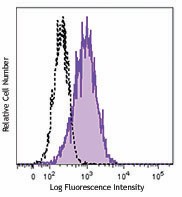
-

Thioglycolate-elicited BALB/c mouse peritoneal macrophages were stained with TLR2 (clone CB225) PE (filled histogram) or rat IgG2a, κ PE isotype control (open histogram).
| Cat # | Size | Price | Quantity Check Availability | Save | ||
|---|---|---|---|---|---|---|
| 148603 | 25 µg | 113€ | ||||
| 148604 | 100 µg | 278€ | ||||
CD282, also known as TLR2, is an 89 kD, type I transmembrane protein, with 14 leucine-rich repeats (LRR) in the extracellular region and one toll/IL-1R (TIR) domain in the intracellular region. TLR2 is mainly expressed on monocytes, macrophages, dendritic cells, granulocytes, and endothelial and epithelial cells. TLR2 associates with TLR1 and TLR6, and mediates the innate immune response against several components of Gram-positive bacteria, such as peptidoglycan, lipoteichoic acid (LTA), lipoarabinomanan, and lipoproteins as well as different LPS from certain Gram-negative bacteria, yeast, spirochetes, and fungi.
Product DetailsProduct Details
- Verified Reactivity
- Mouse
- Antibody Type
- Monoclonal
- Host Species
- Rat
- Immunogen
- Mouse TLR2-transfected Ba/F3 cells.
- Formulation
- Phosphate-buffered solution, pH 7.2, containing 0.09% sodium azide and BSA (origin USA)
- Preparation
- The antibody was purified by affinity chromatography and conjugated with PE under optimal conditions.
- Storage & Handling
- The antibody solution should be stored undiluted between 2°C and 8°C, and protected from prolonged exposure to light. Do not freeze.
- Application
-
FC - Quality tested
- Recommended Usage
-
Each lot of this antibody is quality control tested by immunofluorescent staining with flow cytometric analysis. For flow cytometric staining, the suggested use of this reagent is ≤0.5 µg per million cells in 100 µl volume. It is recommended that the reagent be titrated for optimal performance for each application.
- Excitation Laser
-
Blue Laser (488 nm)
Green Laser (532 nm)/Yellow-Green Laser (561 nm)
- Application Notes
-
1. Shibata T, et al. 2012. Int. Immunol. 24:613. (FC)
- Product Citations
-
- RRID
-
AB_2564119 (BioLegend Cat. No. 148603)
AB_2564120 (BioLegend Cat. No. 148604)
Antigen Details
- Structure
- 89 kD type I transmembrane protein with 14 leucine-rich repeats (LRR) on its extracellular region and one toll/IL-1R (TIR) domain on its intracellular region.
- Distribution
-
Monocytes, macrophages, dendritic cells, granulocytes, endothelial cells, epithelial cells.
- Function
- Activates innate host defense against a diverse set of pathogens.
- Interaction
- TLR1, TLR6.
- Ligand/Receptor
- Microbial lipoproteins, peptidoglycans, lipoteichoic acid.
- Cell Type
- Dendritic cells, Endothelial cells, Epithelial cells, Granulocytes, Macrophages, Monocytes
- Biology Area
- Cell Biology, Immunology, Innate Immunity, Signal Transduction
- Molecular Family
- CD Molecules, Toll Like Receptors
- Antigen References
-
1. Du B, et al. 2013. J. Biol. Chem. 288:15131.
2. Zivkovic A, et al. 2011. J. Immunol. 186:1608.
3. Okun E, et al. 2010. J. Neurochem. 114:462.
4. Kim S, et al. 2009. Nature. 457:102. - Gene ID
- 24088 View all products for this Gene ID
- UniProt
- View information about CD282 on UniProt.org
Related FAQs
- What type of PE do you use in your conjugates?
- We use R-PE in our conjugates.
Other Formats
View All CD282 Reagents Request Custom Conjugation| Description | Clone | Applications |
|---|---|---|
| Purified anti-mouse CD282 (TLR2) | CB225 | FC |
| PE anti-mouse CD282 (TLR2) | CB225 | FC |
Customers Also Purchased
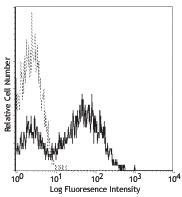
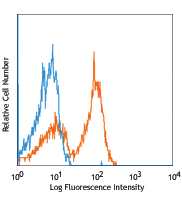
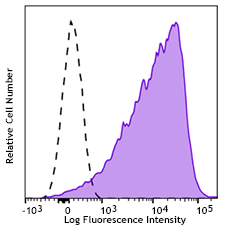
Compare Data Across All Formats
This data display is provided for general comparisons between formats.
Your actual data may vary due to variations in samples, target cells, instruments and their settings, staining conditions, and other factors.
If you need assistance with selecting the best format contact our expert technical support team.
-
Purified anti-mouse CD282 (TLR2)
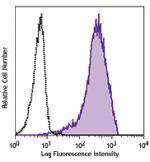
Mouse TLR2-transfected Ba/F3 cells were stained with purifie... -
PE anti-mouse CD282 (TLR2)
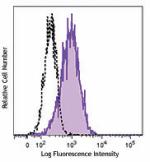
Thioglycolate-elicited BALB/c mouse peritoneal macrophages w...
 Login / Register
Login / Register 










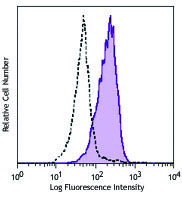



Follow Us